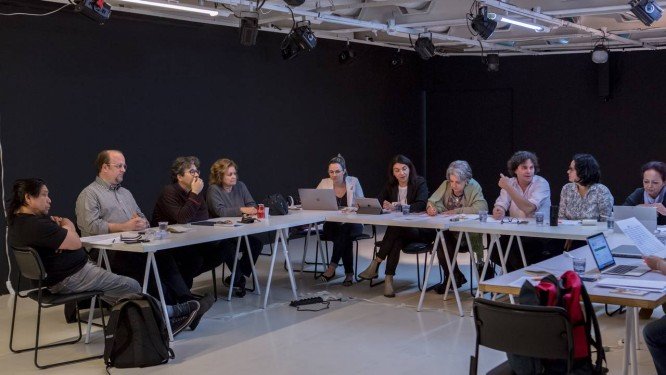Mozambique's Marco Mendonça wins prestigious theatre revelation award in Portugal
Mozambican writers Luis Carlos Patraquim and Mbate Pedro shortlisted for Oceanos Literary Prize

The jury who chose the ten shortlisted books of Literay Prize Oceanos 2018. Photo: André Seiti / Itaú Cultural
Two Mozambicans, five Brazilians and three Portuguese have been shortlisted for the final round of this year’s Oceanos Portuguese Language Literature Prize. Of the 60 semi-final works, five books of poetry, one of short stories and four novels were selected by the jury last Monday, the winner to be revealed on December 7th.
The jury analysed 60 semi-final works – 31 novels, seven short story books and 22 poetry books – with a first edition published in one of six Portuguese-speaking countries: Angola, Brazil, Cape Verde, Mozambique, Portugal and Timor-Leste.
Two of the finalist novels were written by Brazilian authors: “A noite da espera” by Milton Hatoum, who in 2006 won the Portugal Telecom Literature Prize with ” Cinzas do norte”, and ” Pai, pai” by João Silvério Trevisan.
Another two novels came from Portuguese authors: “As pessoas do drama” by H. G. Cancela, and “Hoje estarás comigo no paraíso” by Bruno Vieira Amaral.
The five poetry books represent three countries: O Deus restante, by Luis Carlos Patraquim, and Vácuos, by Mbate Pedro (both from Mozambique); Antiboi, by Ricardo Aleixo, and Câmera lenta, by Marília Garcia (Brazil); and A noite imóvel, by Luis Quintais (Portugal).
Anjo noturno, by the Brazilian Sérgio Sant’Anna, is the only short story volume among the finalist works.
The jury members were: Ana Paula Tavares (Angola), Daniel Munduruku, Flora Sussekind, Heitor Ferraz and Julián Fuks (Brazil), Helena Buesco, Maria João Cantinho and Pedro Mexia (Portugal).
“Oceanos has progressively changed from a prize for Portuguese-language books published in Brazil – as it happened until 2016 – to a prize that provides a snapshot of the literary invention in all quarters, since books originally published in Portuguese in all countries – even those where it is not an official language – can compete,” Selma Caetano, the curator and coordinator of the Oceanos Literary Prize, said in a statement.
“Internationalisation has proven to be the right path. In 2017, of 51 semi-final books, only two had been published in more than one Portuguese-speaking country. In 2018, none of the 60 semi-finalist books has been published in more than one country” Caetano says.
“Internationalisation does not depend only on Brazil. It depends on partnerships, political will and the determination of all who wish to have their literature represented globally, whether with a thousand works, such as Brazil in this year of 2018, or whether with a work, like Timor Leste, because Oceanos is from all Portuguese speakers, for all Portuguese speakers in the world,” she concludes.
The increase in the number of registrations reinforces this evaluation. In 2017, there were 1,215 books; in 2018, Oceanos reached the highest number of registered works, 1,364. All works compete on an equal footing, regardless of the literary genre in which they fall.
The above mentioned increase in registrations also led to the enlargement of the jury. In 2017, the Evaluation Jury – responsible for the initial phase of the prize – was composed of 50 Brazilian and 15 Portuguese jurors, totalling 65 members; in 2018, the panel of judges was formed by 73 writers, journalists, teachers and literary critics. There was also a greater internationalisation, with three from Mozambique, three from Angola, two from Cape Verde, 12 from Portugal and 53 from Brazil.
In December, the 10 works will be evaluated by the final jury, which will choose the four Oceanos winners of 2018. The winners will be disclosed on December 7th. The winner will receive R$100,000 (about EUR 24,000); second place, R$60,000 (EUR 14,200); the third, R$ 40,000 (EUR 9,500) and the fourth, R$30,000 (EUR 7,000).
Oceanos is sponsored by Itaú, the Republic of Portugal (through the Portuguese Cultural Development Fund) and CPFL Energia. In 2018, the group of curators is composed of writer and journalist Isabel Lucas (Portugal), cultural manager Selma Caetano, publisher Mirna Queiroz and journalist Manuel da Costa Pinto (Brazil).
Created in 2003 by Portugal Telecom, the prize was renamed Oceanos after the acquisition of the Portuguese telecommunications company by the French company Altice, in 2015.
Since last year, Oceanos stopped awarding only the titles published in Brazil and opened the competition to books published in Portuguese anywhere in order “to promote the editorial exchange and the reciprocal knowledge between the different expressions cultural and literary” of Lusophony.
In 2017, the Portuguese writer Ana Teresa Pereira was the overall winner with her novel ‘Karen”, succeeding José Luís Peixoto, who won the prize in 2016 with “Galveias”. Last year’s competition also awarded Brazilian Silviano Santiago (Machado), Portuguese Helder Moura Pereira (Golpe de Teatro) and Brazilian Bernardo Carvalho (Simpatia pelo Demônio).
List of 10 finalist authors/books
Bruno Vieira Amaral (Portugal): Hoje estarás comigo no paraíso (novel)
H. G. Cancela (Portugal): As pessoas do drama (novel)
João Silvério Trevisan (Brazil): Pai, pai (novel)
Luís Carlos Patraquim (Mozambique): O Deus restante (poetry)
Luís Quintais (Portugal): A noite imóvel (poetry)
Marília Garcia (Brazil): Câmera lenta (poetry)
Mbate Pedro (Mozambique): Vácuos (poetry)
Milton Hatoum (Brazil): A noite da espera (novel)
Ricardo Aleixo (Brazil): Antiboi (poetry)
Sérgio Sant’Anna (Brazil): Anjo noturno (short stories)












Leave a Reply
Be the First to Comment!
You must be logged in to post a comment.
You must be logged in to post a comment.